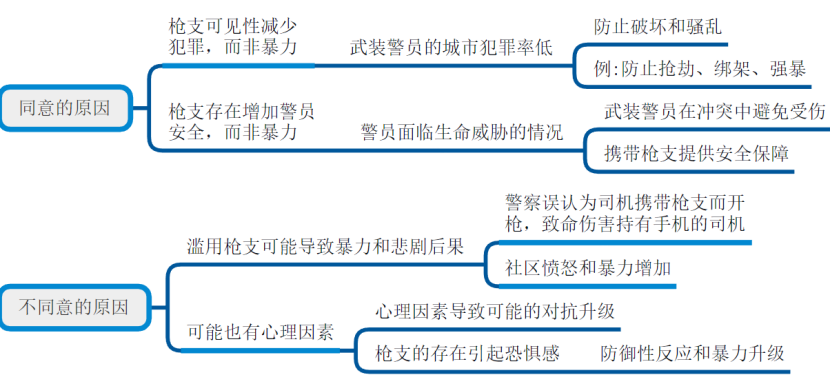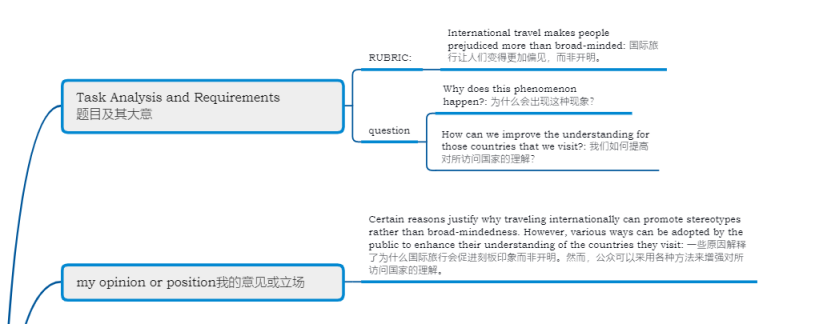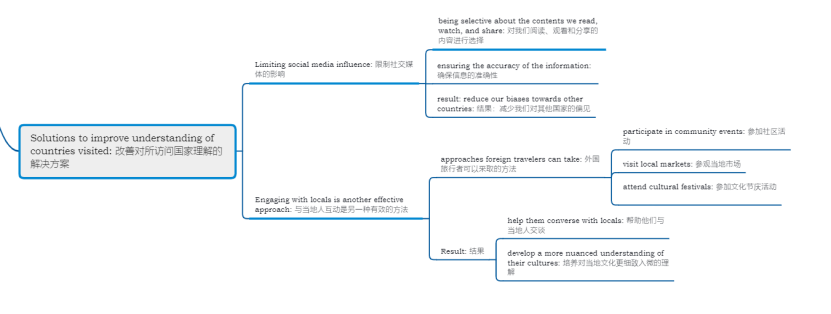本周大作文预测新鲜出炉🔥 可参考日期:10月18日-24日
1. 题目及其大意
Policemen carrying a gun may encourage the level of violence. To what extent do you agree or disagree?

2. 思路提纲

3. 高分范文示例
The issue of whether police officers equipped with firearms may promote aggression is a common topic in modern society. I partly agree that bearing a gun incites violent acts, and my reasons are as follows.
On the one hand, I believe that gun visibility among law enforcement personnel deters crimes instead of encouraging violence. It is quite noticeable that cities with roaming armed officers have lower crime rates. It discourages criminals from damaging properties or causing public disturbances, which instills a sense of security among the citizens, knowing that the armed policemen are around to protect them from potential harm like robbery, kidnapping, rape, etc. Apart from deterrence, it also promotes officers’ safety. It is a fact that policemen always encounter life-threatening situations. If they are armed, they can prevent themselves from being injured by violent confrontations. Hence, carrying a gun offers safety rather than triggers violence.
On the other hand, I cannot deny that misusing firearms can lead to increased violence and tragic consequences. To illustrate, imagine a police officer responding to an alleged kidnapping. Mistakenly assuming the suspect carried a gun, the policeman fired a gunshot, fatally wounding the driver who was holding a mobile phone and not a firearm. This has sparked community outrage, which encouraged violence. Aside from misuse, psychological factors can be a reason. In general, civilians feel intimidated by a policeman due to the mere presence of firearms, and this could escalate confrontations. They become defensive, creating a violent environment rather than a peaceful one.
In conclusion, while it is hard to neglect the fact that gun presence may serve as a deterrent and promote safety, I concur that it can also provoke aggressive behaviors when there’s weapon misuse and when considering psychological reasons.
4. 高分词汇或表达
(1) police officers equipped with firearms 装备枪支的警察
(2) promote aggression 促进攻击行为
(3) bearing a gun 持枪
(4) incites violent acts 煽动暴力行为
(5) gun visibility 枪支可见性
(6) causing public disturbances 引发公共骚乱
(7) law enforcement personnel 执法人员
(8) deters crimes 震慑犯罪
(9) roaming armed officers 巡逻武装警察
(10) instills a sense of security 注入安全感
(11) perceive 察觉
(12) Apart from deterrence 除了威慑力之外
(13) life-threatening situations 威胁生命的情况
(14) triggers violence 引发暴力
(15) increased violence 暴力增加
(16) tragic consequences 悲惨后果
(17) alleged kidnapping 涉嫌绑架
(18) Mistakenly assuming 错误假设
(19) fatally wounding 致命伤害
(20) sparked community outrage 引发社区愤怒
(21) intimidated 感到恐惧
(22) gun presence 枪支存在
(23) provoke aggressive behaviors 引发攻击行为
(24) weapon misuse 武器滥用
(25) psychological factors 心理因素
(26) become defensive 变得防御性
(27) violent environment 暴力环境
(28) escalate 升级
(29) presence of firearms 枪支的存在
(30) escalate confrontations 升级对抗
1、题目及其大意
Some people think adults should learn practical skills by themselves, while others believe that learning from a teacher in a classroom is better. Discuss both views and give your own opinion.

2、思路提纲

3、高分范文示例
Various perspectives on the most effective approach to learning practical skills are on the rise. Some suggest studying independently, while others encourage in-classroom learning with professional educators. I think both sides have merits, but I prefer the latter.
On the one hand, learning independently is good as it eliminates personal issues or distractions. Usually, when learning with teachers, trainees get annoyed easily when someone frequently reminds, corrects their flaws, or trains them at such a speed they dislike. This leads to conflicts and sometimes interrupted learning. By contrast, learning by oneself, adults can work at their own pace without having people tell them what to do next or how to do it. They discover techniques on their own and perfect a particular skill without others’ help, which in the end develop their self-esteem and overall knowledge.
On the other hand, it cannot be denied that in any form of learning, teachers play crucial roles when humans need to learn something. Whether it is practical skills or other forms of knowledge, teachers have a wider range of wisdom and numerous experiences to share with their students. Despite being grown-ups, adults would still encounter challenges especially when starting new things or acquiring new sets of skills. In this case, teachers’ guidance, especially in a classroom setting where interaction is present, is highly needed. With useful feedback, hands-on experience, and one-on-one coaching with a specialist, effective learning results can be much quickly achieved compared to self-learning.
In conclusion, although self-study brings benefits, if a person wants to gain greater results in a shorter time, I concur that studying with teachers makes a better choice.
Word count: 271
4、高分词汇或表达
(1) Various perspectives 各种观点
(2) most effective approach 最有效的方法
(3) practical skills 实用技能
(4) on the rise正在崛起
(5) I prefer the latter我更喜欢后者
(6) studying independently独立学习
(7) in-classroom learning课堂学习
(8) form of learning学习形式
(9) eliminates personal issues or distractions消除个人问题或干扰
(10) trainees get annoyed easily 学员很容易生气
(11) perfect a particular skill 完善特定技能
(12) a wider range of wisdom 更广泛的智慧
(13) encounter challenges 遇到挑战
(14) hands-on experience实践经验
(15) one-on-one coaching 一对一辅导
(16) specialist专家
(17) I concur that我同意这一点
1、题目及其大意
International travel makes people prejudiced more than broad-minded. Why does this phenomenon happen? How can we improve the understanding for those countries that we visit?

2、思路提纲


3、高分范文示例
Nowadays, traveling abroad has become increasingly common, but this sometimes leads to prejudice. Certain reasons justify why traveling internationally can promote stereotypes rather than broad-mindedness. However, various ways can be adopted by the public to enhance their understanding of the countries they visit.
One of the most obvious reasons for narrow-mindedness when people travel overseas is preconceived notions. Many individuals may have heard about a particular country without having visited it personally. This information may come from TV, social media, or conversations with others. For instance, some people believe that the French are arrogant. This stereotype is often reinforced by the movies we watch, leading travelers to perceive people who live in France in this negative light. Another reason for prejudice could be the fear of the unknown. For instance, when traveling to an unfamiliar place like Japan, a traveler becomes overly cautious and avoid interacting with locals due to fears of language barriers or offending cultural norms. In such cases, people tend to rely on stereotypes as a defense mechanism.
Fortunately, we can address this phenomenon, and one solution we can all adopt is limiting social media influence. By being selective about the contents we read, watch, and share, as well as ensuring the accuracy of the information we consume, we can reduce our biases towards other countries. Furthermore, engaging with locals is another effective approach. When traveling, people should seek out community events they can participate in, visit local markets, and attend cultural festivals. These activities will help them converse with locals and develop a more nuanced understanding of their cultures.
In conclusion, preconceived opinions and anxiety about uncertainty often lead to partiality against foreigners. Fortunately, measures such as limiting social media impact and increasing interaction with locals can discourage these assumptions and promote tolerance.
Word count: 297
4、高分词汇或表达
(1) promote stereotypes rather than broad-mindedness: 可能促进刻板印象而非开明
(2) ways can be adopted: 可以采用的方法
(3) One of the most obvious reasons for narrow-mindedness: 狭隘思想最明显的原因之一
(4) preconceived notions: 先入为主的观念
(5) fear of the unknown: 对未知的恐惧
(6) reinforced: 被强化
(7) overly cautious: 过于谨慎
(8) defense mechanism: 防御机制
(9) one solution we can all adopt: 我们都可以采取的一个解决方案
(10) converse with locals: 与当地人交谈
(11) nuanced understanding: 细致入微的理解
(12) anxiety about uncertainty: 对不确定性的焦虑
(13) partiality against foreigners: 对外国人的偏见
(14) discourage these assumptions and promote tolerance: 遏制这些假设并促进宽容
(15) overly cautious: 过于谨慎
(16) language barriers: 语言障碍
(17) cultural norms: 文化规范
(18) stereotypes: 刻板印象
(19) being selective: 有选择性
(20) biases: 偏见
(21) seek out: 寻找















